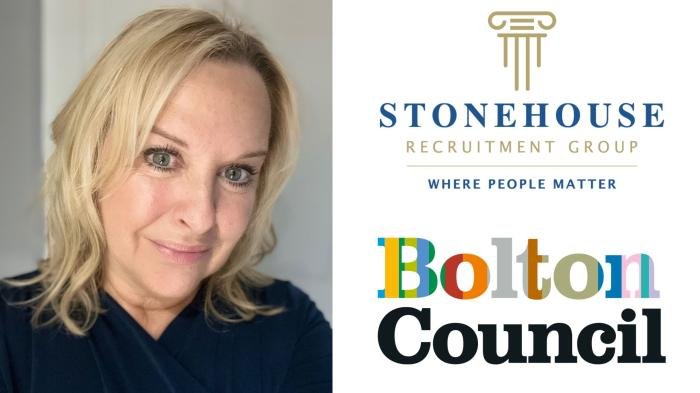
Jane Gowing began her career as a Planning Admin Officer and worked her way up to Director level. Now she acts as Head of Planning and Building Control for Bolton Council, enacting positive change and re-structuring the service.
She is someone who relishes a challenge, champions the young people she works with today and has a dream of changing the perception of planners which can often create barriers between them and the public.
I sat down with Jane in a coffee shop in Bolton and felt thoroughly inspired by her journey. She is a fantastic example for young people everywhere, urging you take every opportunity that comes your way and to face every challenge with determination.
I hope you enjoy what she has to say, I certainly did.
So Jane, can you tell me about your first role in planning and what made you get into it in the first place?
I started as an Admin Officer, and there was no grand plan to enter the planning profession. However, I was intrigued by the work, so I applied for the job right after my A-levels. My early days involved making application files, conducting property searches, and updating records – back in the days of paper plans and files! These tasks sparked an interest in the planning world, and I took courses to pursue a degree. Over the next 4-5 years, I completed both my degree and Master’s while working full-time. It was probably the first challenge I undertook that showed me I had an aptitude for new and interesting things. This journey taught me that success often stems from curiosity and perseverance. As they say, “The harder you work, the luckier you get”
When was the first time you felt you could move up the ladder, and did you find the experience daunting, exciting, or otherwise?
While pursuing my degree, I was fortunate to secure a promotion to Enforcement Officer and later Senior Enforcement Officer. Around this time, two planners were leaving the council, and I was encouraged to apply for one of the roles – all while finishing my studies. This was a pivotal moment for me. The opportunity to put my education into practice while continuing my development as a planner was both exciting and empowering. I embraced the challenge. Growth can be intimidating, but every step up the ladder is a chance to rise to the occasion and prove to yourself what you are capable of. It’s actually funny to think now, when I came into the office one day my Senior Officer told me he was announcing his retirement on the Friday. He said he’d taught me everything he could and he hoped that I’d go for it. So I did! And I’m glad I did because it opened me up to all the other opportunities that would eventually come my way.
What are some of the challenges you have faced along the way?
Balancing full-time work and day-release studies was certainly a challenge, but I knew the hard work would pay off. After completing my master’s, I also pursued a post-graduate qualification in Management Studies, as I had my sights set on leadership roles. During this period, I had my first child, which brought an additional layer of complexity to my life. Yet, it was an experience that taught me resilience. So it was a lot of juggling studies, childcare and then taking on a role as Team Leader. When you believe in your goals, you find the strength to keep moving forward. It is all about embracing the juggle and knowing that hard work, combined with passion, will always bring results.
Tell me a bit about how the industry has changed since you first joined it and how has this impacted your career, if at all?
When I had my second child, I was already at a Team Leader level in Development Management (DM). While on maternity leave, the DM Manager’s role became available. Despite being on leave, I applied, interviewed, and was appointed to the role. So, when I returned to work, I stepped into a senior manager position with one toddler and a five-month-old baby. This was back in 2002 when balancing career and family life was even more challenging. At the time, I felt the need to do everything at 100%. But now, I’m glad to see how far we’ve come – with more flexible working arrangements, hybrid models, and a much greater acceptance of women in leadership roles across planning. When you proposed doing this interview, it made me reflect on that time. I don’t think I realised at the time just how difficult it was to have two small children and to take on a whole new management responsibility. I just kind of got on with it and did my best. So it wasn’t really until I looked back that I realised I’m very proud of how I did, and proud that I could set some sort of example. Not that I think I’m a trailblazer! But at the time, it wasn’t really the norm to have a woman in that position, especially someone who is new to the role returning from maternity leave! And looking at how the industry has changed, there is so much more work being done to get people from underrepresented backgrounds involved with planning. There have been a few people who have paved the way for young people of all kinds of backgrounds and beliefs to have a voice in this industry. There is a saying that I’ve always liked “Success is not just about reaching the top; it’s about breaking barriers for those who come after.”
What’s the best thing about having reached where you currently are on the professional ladder?
With seniority comes responsibility. I firmly believe we must share our knowledge and experience to help others. I am passionate about mentoring junior planners, guiding them through the complexities of this profession, and helping them flourish. It is a challenging field, but if I can make someone’s journey easier, it’s time well spent. Currently, I am working informally with a group of Assistant Planners, mentoring them and passing on what I’ve learned. Leadership is not about being in charge, it’s about taking care of those in your charge. It’s something as simple as giving five or ten minutes here and there that can sometimes make an entire task easier for someone else. A lot of people have the eagerness to improve but just don’t have the tools to do so. To me, spending five minutes or even half an hour to help someone improve for the long term is well worth it.
What’s the most challenging thing about your position?
One of the biggest challenges we face as planners is public perception. There is a misconception that planners are blockers of development, but we don’t make the laws – we enforce them. We are responsible for ensuring sustainable development within legal frameworks, which can often make us a target. However, I remain optimistic. With the growing recognition of planners in delivering key projects and driving change, there is an opportunity to demystify our role. Planning is about problem-solving and collaboration. Our job is to work together across the industry to build better places for everyone. And it seems a real light is being shone on the importance of our work at the moment, hopefully that will stay consistent and we can start to build a better perception of the work we actually do.
Have you reached the level you wanted to, or do you want to go even higher?
I am very satisfied with where I am now. I have recently worked at the Director level, and my current role as a Consultant allows me to work strategically with Local Planning Authorities (LPAs) that are facing challenges or need transformation. My goal is to make a meaningful impact, helping LPAs improve service delivery and performance. Working at the Head of Service level gives me the autonomy to create lasting change, which is deeply rewarding. For me, it is about making the most significant difference where it counts. I am very happy with the kind of work I’m doing now and I don’t have any wish at the moment to go back to that director level. But when my work is done at a certain place, you never know what the next opportunity will be so I never say never.
What advice would you give to people trying to take the next step in their career?
My advice? Go for it. Believe in yourself and never stop investing in your development. Opportunities often come to those who seek them out. Build informal networks, learn the softer skills that complement your technical expertise, and remain open to continuous learning as results don’t come from what you do occasionally, they come from what you do consistently. Focus on growth, stay curious, and take every opportunity to improve your future. Say yes to opportunities. If you have managers and seniors that believe in you and allow you to flourish don’t shy away from it. Take every opportunity you can and look a challenge in the yes and say “I can do this.”
I’d like to thank Jane for meeting me and having such an honest and eye opening conversation. I look forward to seeing the great work she continues to do.
If you have any questions about starting out in planning or taking the next step in your career, please do reach out to me at jake@stonehouserg.com.



